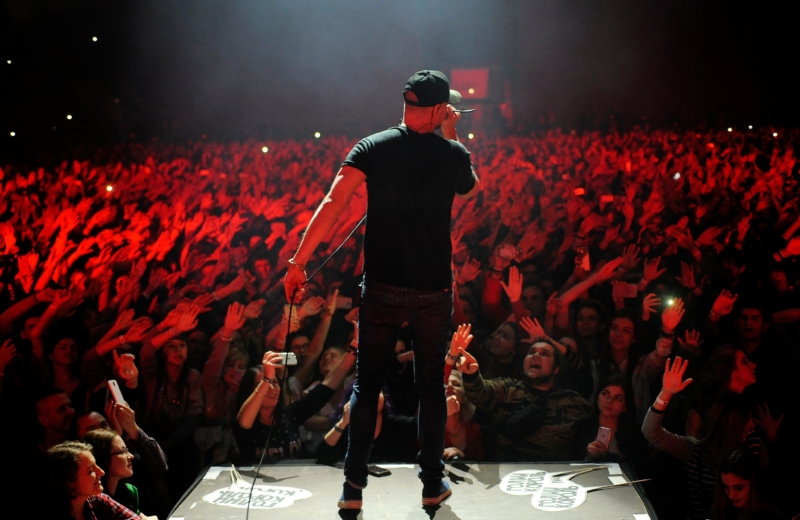Andrii Khlyvniuk, the leader of Ukrainian band Boombox, is one of the most prominent figures in modern Ukrainian music.
Boombox, a band whose style combines hip-hop and rock music, recently celebrated 14 years. In 2013, the band received the Yuna music award as the best Ukrainian band.
They are also one of the few Ukrainian bands that have refused to give shows in Russia after it annexed Crimea and unleashed its war in the east of Ukraine in 2014.
The decision, however, hasn’t affected the band’s popularity. Boombox attracts thousands of fans to some of the biggest concert halls in the country, goes on national tours, and performs abroad.
Khlyvniuk, one of the two co-founders of Boombox, is the lead singer and writes most of the band’s songs.
“I wanted to devote all my time to my favorite occupation. I dreamed of doing what I love all my life. And I’m doing it,” Khlyvniuk told the Kyiv Post in an interview on April 3.
Over its 14-year history, Boombox’s output has ranged from light-hearted songs with dance rhythms to lyrical ballads with philosophical themes.
Right now, Boombox is in the middle of a tour to promote their latest release, an EP called “Holyi korol (Naked king).”
The tour will cover 22 big Ukrainian cities, as well as five other countries — the United States, Canada, Poland, Spain and Portugal.
The band’s show in Kyiv in November attracted over 10,000 fans. The band’s audience abroad is mostly Ukrainian diaspora and people from the former Soviet republics.
Khlyvniuk says that they perform on smaller stages abroad, mostly in clubs, and that performances at stadiums and in small clubs differ greatly.
“Stadiums are cool because you can kick up your heels there,” Khlyvniuk said. “But a club gives a direct exchange of energy, and it shows who you really are.”
Another exciting thing that recently happened to Boombox was the collaboration with an internationally famous U.S. brand ’47.
The company that specializes in headwear designed and produced caps for Boombox: where their caps usually have logos of American sports teams, these ones carry a Cyrillic letter “B”.
Khlyvniuk says that the company representatives found out that Boombox members have been wearing their headwear for years, and offered to work together. The band now sells the caps through their social media pages for Hr 830–930.
Foundation stones
Klyvniuk says the reason Boombox has remained one of Ukraine’s top bands for so long is that every member of their team, including producers, managers, musicians, video, audio and light engineers, is a fan of what they do. “Each one of them has the ambition of becoming better,” he added.
The band started as a trio — Khlyvniuk as the lead singer, guitarist Andrii Samiilo, and DJ Valik Matiyuk. Over the years, three other members joined: drummer Alexander Lyulyakin, bass guitarist Denys Levchenko, and keyboardist Pavlo Lytvynenko.
Boombox also has a rare thing to be proud of — not a single member has ever left the band. And the public has never heard of any of their internal disputes.
Khlyvniuk says that Boombox, like any other group, has arguments, but they prefer to keep them to themselves. “It’s a question of what you want others to remember about you,” he said.

The lead singer of Ukrainian band Boombox Andrii Khlyvniuk talks to the Kyiv Post at Kitaiski Privet restaurant in Kyiv on April 3. (Volodymyr Petrov)
Protesting and supporting
During the EuroMaidan Revolution, which forced ex-President Viktor Yanukovych from power in 2014, Khlyvniuk was one of the public figures who supported the protest.
After Russia started its war in eastern Ukraine, Boombox decided to give up performing in the neighboring country, despite the fact that they made two-thirds of their earnings there at the time.
Khlyvniuk said he doesn’t hold anything against his Russian fans or Russians in general.
However, he says he doesn’t want to ask the Russian government for permission to work in the country and hold events there.
“It (the permission) is given by people with epaulets, the same people that give orders to shoot me,” Khlyvniuk said, by “me” meaning Ukraine and his compatriots who fight Russian troops and Russian-backed separatists in the Donbas.
For more than a year, Khlyvniuk has been dedicating performances of their hit song “Naodyntsi” (“All Alone”) to Ukrainians held as political prisoners in Russia.
There are at least 65 of them now, with filmmaker Oleg Sentsov and activist Oleksandr Kolchenko being the best-known ones. “It doesn’t matter if it’s Sentsov, or Kolchenko, or someone else. They are us,” Khlyvniuk said.
In 2016, the band’s drummer Lyulyakin wrote music for a play by the Belarus Free Theater called “The Burning Doors,” aimed at raising international awareness about political persecution in Russia. The play tells the stories of three prisoners — Russian performance artist Petr Pavlensky, Pussy Riot’s Maria Alyokhina, and Ukrainian Sentsov.
In the part about Sentsov, the actors sing “Naodyntsi” by Boombox. After the play was released, Khlyvniuk took his advocacy further and spoke about political persecution in Russia at the U.K. parliament along with other activists in 2016.
While the play has received critical acclaim worldwide, it has yet to be performed in Ukraine. Today Khlyvniuk is seeking financial backing to bring it to the country.
To him, getting involved in the campaign to help political prisoners was a natural response to oppression. “There is so much injustice in the world — grab any one you want, and solve it,” Khlyvniuk said.
Boombox has two upcoming shows in Kyiv. April 20, 21. 8 p.m. Atlas (37-41 Sichovykh Striltsiv St.) Hr 599-2,199



